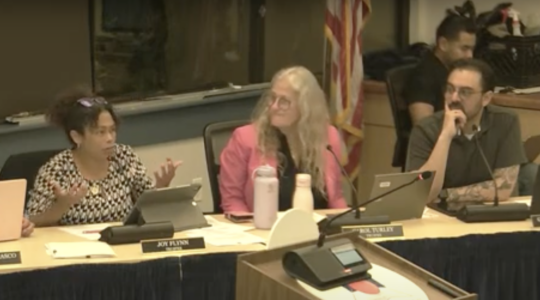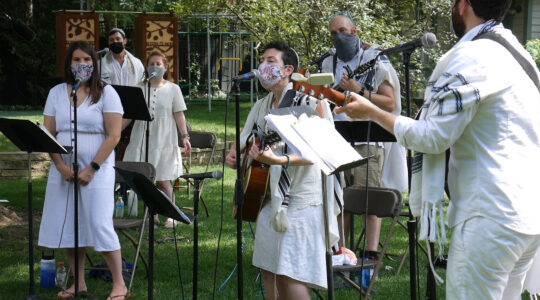Is free good or bad when it comes to attracting young Jews to Jewish events? That was one of the questions on the table at a panel discussion Dec. 1 at the launch of the latest edition of PresenTense magazine.
The answer, surprisingly, may be, eh, not so much.
Held at the offices of the Samuel Bronfman Foundation, the discussion on philanthropy and young Jews featured Gali Cooks, the director of the Stanley Kaplan Family Foundation; Rabbi Andy Bachman, a pulpit rabbi and director of the group Brooklyn Jews; and Rabbi Ari Weiss of Uri L’Tzedek. It was moderated by Tamar Snyder of The New York Jewish Week.
All in all, pretty interesting.
While the founders and major backers of Birthright Israel and Birthright Israel NEXT keep insisting that free is the only way to go if you want to bring young Jews into the fold, all three panelists sounded unconvinced.
"It’s kind of a mixed bag," Cooks told a group of about 30 contributors and readers of PT.
Right now, she said, the pendulum has swung fully toward giving away Jewish programming in hopes of attracting disaffected Jews. But, she added, you have to find a middle ground.
Cooks, who before taking over at Kaplan helped start the PJ Library Program for the Harold Grinspoon Foundation, has an interesting perspective on the situation.
The PJ Library, which gives away free Jewish children’s books, costs the foundation $40 per child to give one book a month per year. When the initiative was launched, the foundation considered charging parents a nominal fee, but ultimately decided against it, essentially "because of the Birthright craze," Cooks said. And because it was free, the foundation was able to sign up thousands of kids for the program.
The foundation experimented with the idea of asking parents to contribute $18 annually if they wanted to continue receiving the books after the first year. The response was a resounding "no."
So free sometimes is simply necessary, especially if a program is looking for large-scale reach.
But free does have its drawbacks, Cooks said. Namely that it is very expensive and, in the case of Birthright, which costs in the neighborhood of $100 million per year, "you can’t sustain the model — unless maybe you buy an airline."
Bachman tended to agree with Cooks, saying that ultimately it is the quality of the program that is important. In running his organization and synagogue, he has found that the most important factor in attracting young Jews is providing an environment where they can socialize with the people they find desirable.
"I think free is overrated," Bachman said.
Cooks on social entrepreneurs?
While much of the Jewish philanthropic world has latched onto notions-cum-catchphrases such as "innovation," "paradigm shifts" and "social entrepreneur," Cooks told the audience of mostly 20-somethings that catchphrases essentially are worthless unless the people behind them provide results.
"I’m not a fan of ‘social entrepreneurs,’ " she said. "I hear words like ‘innovation’ and ‘values,’ and it’s like, ‘What are you talking about?’
"It’s easy to appoint yourself a social entrepreneur, but you need to earn it. It’s not like Wendy Kopp [the founder of Teach for America] finished her dissertation and said, ‘OK, I am a social entrepreneur.’ You need 10 years of dirt under your fingers. I don’t like it when people just use language."
Cooks insisted she is not a cynic but a skeptic.
Still, after meeting with scores of self-appointed social entrepreneurs, Cooks seems a little fed up with jargon and what she sees as misplaced hubris. Her audience included many who consider themselves social entrepreneurs, so she offered them tips on how to stay off of her "What do social entrepreneurs do wrong?" list.
Most of the tips centered on having "proper meeting hygiene," as she called it.
Often she meets with young social entrepreneurs who, while clearly excited about their own ideas, are not ready to listen to others and may be touched with a bit of narcissism.
"Never assume, and listen. Ask questions," she said — and never make assumptions, and be prepared.
To hammer home the overall message, Cooks recounted a recent meeting with a social entrepreneur who talked and talked.
"It was buzzword, buzzword, buzzword," she said.
As the person made a pitch for money from the Kaplan foundation, he mentioned that he had been reading the foundation’s Web site and saw a really great opportunity for partnership.
The problem?
"We don’t have a Web site," Cooks said.
Cooks gets the feeling that self-described social entrepreneurs often believe that they are inventing the wheel while in truth most of the projects have been tried in one way or another. The independent minyan movement, for instance, is not all that far off from the Havurah movement of the 1970s. The Joshua Venture existed previously in the non-Jewish world. It’s called Echoing Green.
That’s not to say that repeating and perfecting old ideas is bad. But the key is execution, and a social entrepreneur should "know who came before you and that others came before you."
"If you didn’t do your research and you didn’t do your homework, it’s not a good sign," Cooks said, adding that doing something new does not mean bucking the old.
She’s not a cynic; she’s a skeptic.
To be clear. Cooks said after the meeting that she viewed PresenTense as an example of how social entrepreneurs should work and prepare.
JTA has documented Jewish history in real-time for over a century. Keep our journalism strong by joining us in supporting independent, award-winning reporting.





